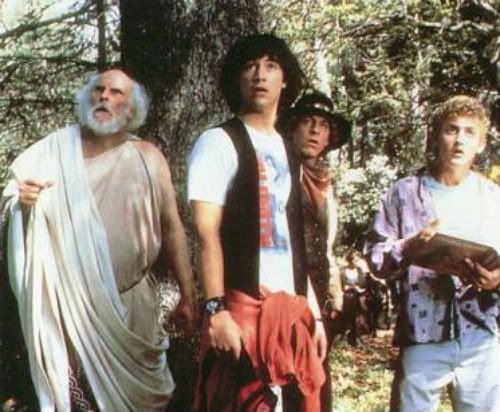One problem I have observed with students at Cal State Fullerton is that they tend to view education as a means to an end, rather than an end in itself. That is, they view all these classes, papers, and tests in mostly economic terms. They are going to college so that they will get a higher-paying job.
This mindset makes sense in a capitalist/consumer culture like America. College is an economic transaction. Students pay tuition, do the work, get a diploma, get a job. Done.
The element that often gets left out of this equation, however, is the value of education as an end in itself. The pleasure of reading Shakespeare or Jane Austen or Kurt Vonnegut. The wonder of trying to understand where we came from and the world we live in. The strangeness and beauty of learning about other cultures and belief systems that are totally foreign to us. The frustration and disagreement and complexity and excitement of informed political debate. All of this stuff gets left out if education is viewed primarily as an economic transaction.
I am speaking in broad terms here. Certainly there are students who engage passionately with the material they study, but in my experience as an instructor of freshman English, these students are the exception to the rule.
For my first few years of teaching, I would get incredibly frustrated trying to get students to discuss an essay we’d read. I would ask a question, and then look out on a sea of silent, blank, bored stares. One or two outgoing students might offer an opinion or insight, but it was really hard to get my students to actually give a shit about what they’d read.
Lately, I have begun to see my role as a teacher as one who inspires. I try to elicit an emotional response from my students, to shake them from their boredom and apathy, to help them see that reading and writing and thinking deeply about the world are pretty damned important.
Sometimes I succeed and sometimes I do not. Just last week, I read an essay I’d written about the band Weezer to my students, hoping it would spark some discussion about popular music. In the essay, I continually referred to Weezer’s post-Pinkerton albums as “shit.” Mindless, corporate shit. One girl, presumably a die-hard Weezer fan, got so angry that she stormed out of the classroom.
At first, I was shocked. That had never happened before. But then something extraordinary happened. The students began to have a conversation, an intelligent argument. The girl who stormed out was back this week. I think she is still mad at me. To be honest, I would rather have a student angry than indifferent.
What I’m realizing is that the more I share my writing, my passion, with my students, the more likely they are to respond. I want to inspire my students, and not simply convey information to them. Because that is boring. And boredom is evil.
A great example of this is the movie “Bill and Ted’s Excellent Adventure”, which I recently watched for probably the 54th time. Watching that movie, and thinking about education, I realized that “Bill and Ted’s Excellent Adventure” is about competing philosophies of learning. Bill and Ted are failing their history class because their teacher is really boring. Why should they care about Joan of Arc or Genghis Khan? They live in San Dimas. They go to the mall and water parks. But when Rufus, the time traveling guide, gives them a time machine to explore history for themselves, to actually meet historical figures, they realize that history is really important and interesting.
Obviously, we don’t have time machines in the real world. But Rufus provides a model of a different, and more effective teacher. He promotes hands-on, interpersonal, active learning. He empowers Bill and Ted to think differently about themselves. They are not losers, as their parents and teachers continually tell them. They are sincere, and excellent, dudes who just needed someone to inspire them, like Rufus.

Bill and Ted with Socrates and Billy the Kid in Medieval Europe. They are about to meet the "royal babes."
